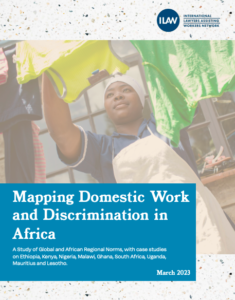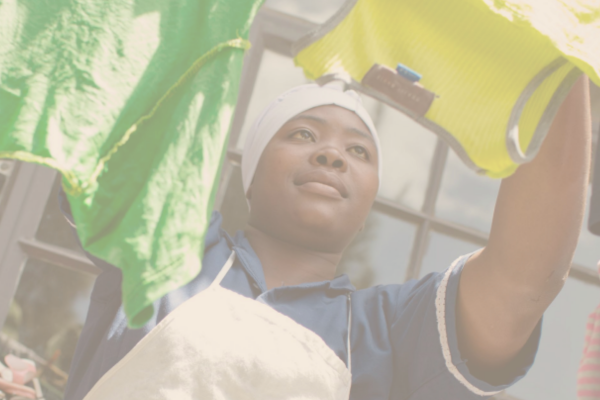The International Lawyers Assisting Workers (ILAW), a programme of the Solidarity Centre, recently launched a report, “Mapping Domestic Work and Employment Discrimination in Africa: A Study of Global and African Regional Human Rights Norms” which analyses gaps in regulation of domestic work in nine countries in Africa, namely, Ethiopia, Lesotho, Nigeria, Kenya, Uganda, Malawi, Mauritius, Ghana and South Africa.
The report was born of two historic milestones in the recognition of domestic work:
- the ten-year anniversary of the adoption of ILO Convention 189;
- and the second anniversary of the landmark South African Constitutional court decision in Mahlangu v Minister of Labour and Others (2020).
ILO and international human rights norms
ILO Convention 189 represents the most comprehensive source of norms on domestic worker rights, but it is not widely ratified. Indeed, it has only been ratified by five countries in Africa, and only two in the study: South Africa and Mauritius. However, there is an increasing recognition of human rights violations in the domestic work sector by United Nations treaty bodies, which are widely ratified by the nine countries. Treaty bodies have recommended labor inspectors be empowered to inspect home without prior notice or consent of the homeowner, be included in workers compensation, social security schemes and national minimum wage. In the Special Rapporteur 2018 report on contemporary forms of slavery, former SR Urmila Bhoola, describes domestic work as on a continuum, framed on the end by decent work, and on the other, by slavery-like practices and forced labour. She concludes that…not all women in domestic work are equally vulnerable to slavery like practices. On this analyses, decent work and inclusion in labour law protection decrease vulnerability and is the antidote to slavery like practices.
South Africa: According to the ILO, 8.1% of employed people are engaged in domestic work. As of March 2021, there were about 848, 000 domestic workers, 96% of whom were women. This makes domestic work a highly feminized employment sector and the fourth largest employer of women in the country. Many domestic workers are also likely to be migrant workers. ~ILAW report
Mhlangu and indirect intersectional discrimination
In Mahlangu v Minister of Labour, the South African Constitutional Court found that exclusion of domestic workers from claiming from the workers compensation fund, amounted to an irrational differentiation, and constituted direct discrimination. The court went further to find that since domestic workers are predominantly black women, the exclusion amounted to indirect discrimination on the grounds of race, class and gender, and was retrospectively unconstitutional. The court recognised that the legislative exclusion was a product of the invisibility of domestic workers, itself a legacy of colonial and apartheid legal systems.
Three forms of exclusion of domestic workers from labour law
“Mapping Discrimination and Domestic Workers in Africa” identifies three predominant forms of continued exclusion of domestic workers under labour law, in the post-colonial African context.
The first approach is characterised by the exclusion of the category of “domestic worker” either entirely from labour law (Ethiopia), or their exclusion from critical labor law provisions, such as the exclusion from workers compensation (Lesotho) or the exclusion of recruiters of domestic workers from regulation (Uganda). The widespread exclusion of the sub-category of family members employed as domestic workers entirely from labour laws (Ethiopia, Uganda, Kenya, Nigeria, Mauritius), makes clear that they are one of the most vulnerable categories of domestic workers.
In the second category, domestic workers as a sector are not explicitly excluded from labour law, rather they are structurally excluded from critical labour law protections which only apply to employers employing above a certain threshold number of employees. For example, preventative provisions on sexual harassment bind employers of 20 or more employees in Kenya (in Uganda, employers of more than 25 employees), while in Malawi, only employers of more than five employees are obliged to provide written contracts. In Nigeria, maternity protection provisions apply to industrial, commercial and agricultural undertakings, thereby excluding domestic workers. Similarly, the requirement to pay national minimum wage, applies to employers of over 50 workers. These neutral frameworks “structurally” exclude domestic workers – who are frequently the sole employees in private homes – from labour law protection.
While decent work presupposes inclusion within labor law protections, this in and of itself is frequently not sufficient to ensure decent work for domestic workers. For example, in eight of the nine countries surveyed, domestic workers are not legislatively excluded from collective labour rights. Despite the absence of exclusion, in none of the countries, are they effectively able to enjoy dedicated bargaining structures in the sector. Further, labour inspectors are largely excluded from inspection of homes without either the consent of the owner or a court order, rendering law largely unenforceable.
Hence, the third approach is to pass sector specific regulations, which reflect the specific needs of workers in the sector and as such are positive models for regulation. However, even within these specific domestic worker regulations, in some cases, the standards entrenched for domestic workers are lower than those afforded other workers (example disparities in Mauritius with respect to leave, hours of work etc). Further, there are tensions as to which standards prevail; in the event of conflict between domestic worker regulation and labour law (in Ghana, labour law trumps regulations, while in Mauritius, regulation trumps labour law). In addition, critical issues that are specific to live in-domestic workers -another particularly vulnerable category of domestic workers- such as standards of accommodation, rights of access to family and visitors and freedom of movement, remain unaddressed in labour law frameworks.
African constitutionalism and indirect discrimination
The report is, however, optimistic that the nine country constitutional frameworks could develop the doctrinal tools to effectively respond to indirect discrimination. Indeed, many of their textual starting points include the recognition of intersectional disadvantage. For example, constitutions prohibit discrimination on a wide range of grounds, including “social origin” (Ethiopia, Lesotho) and “economic status” (Uganda, Ghana). Further, many of these constitutions explicitly obligate states to adopt special measures to address those who have historically discriminated against and eliminate laws customs and practices that oppress or cause harm to women. Accordingly, Mahlangu could serve as a critical precedent for analyses of the discriminatory impacts of facially neutral laws; and its use of intersectionality provides an important guide to “letting history in” to the conversation on discrimination and domestic work.
Read the full report: Mapping Domestic Work and Employment Discrimination in Africa: A Study of Global and African Regional Human Rights Norms

You might like:
Domestic workers demand better access to social protection






